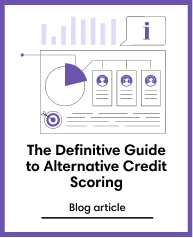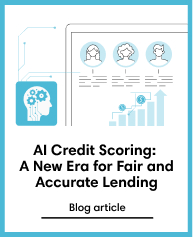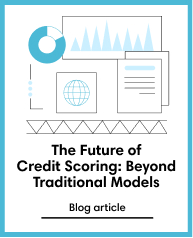Credit Scoring
Sep 24, 2021
How new credit scores determine a clients' creditworthiness
Subscribe to our newsletter
The solvency of a person is the most relevant indicator that stipulates whether or not an individual is eligible to receive a loan. Traditionally, it is determined by taking into account the credit history and the repayment ability of the applicant. However, present-day score apps bring a new light on the subject by broadening the parameters that constitute solvency, allowing the credit market to become more and more inclusive.
A person's credit rating is identified by a credit score, a numerical scale that indicates how reliable a person is in obtaining more debt. The higher the score, the more chances a person has not only of obtaining a loan, but also of getting better financing. The emergence of new mobile scores allow lenders to get the full picture of an applicant’s standing, instead of just relying on traditional sources of information. This means that, through the use of metadata, new mobile scores can know the behavior of a person in real time and obtain non-linear prediction schemes that result in much more assertive credit profiles.
Metadata is data that describe other data. Thus, alternative scoring doesn't use personal data, but anonymous, non-intrusive information that enhances the financial capacity of clients while safeguarding their privacy. In this way, with the help of artificial intelligence meaningful credit information is created allowing new creditworthy clients, currently outside the banking system, to obtain a good score. Our solution is an example of how modern score apps work. The white label application converts the customer's smartphone metadata into credit scores, after obtaining consent to access to the device data.
In emerging economies, traditional scoring processes exclude the aforementioned unbanked population. Many of the underfinanced are reliable, but as they have no credit history they are labeled as non-creditworthy. In this way, new alternative scores become an opportunity for lenders to exploit new unexplored market segments. In turn, data enrichment and artificial intelligence allow companies to obtain better insights and make much better decisions, reducing credit risk at higher levels than traditional scoring methods.
Added to the democratization of the credit market and the reduction of risk, mobile scores also allow companies to get a better understanding of their customers . Thanks to algorithms and the use of metadata, future customer behavior can be predicted, offering more personalized products. In this way, customers receive what they need when they need it, and thus become satisfied with the service, which makes it easier to develop an effective retention policy.
To conclude, scores apps are changing the solvency parameters. Hence, by adopting alternative scoring, companies can reach out to more customers and reduce risk, obtaining higher profits. In turn, clients can access better credit opportunities by improving their financial quality.





